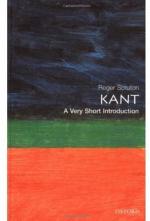|
This section contains 790 words (approx. 2 pages at 400 words per page) |

|
Chapter 5: The Categorical Imperative Summary and Analysis
Before Kant can ground an ethical theory, he must first resolve what is commonly called the paradox freedom. The paradox highlights the apparent contradiction between one's sense of freedom—a person thinks that he is the cause of his own actions—and the seemingly universal law of causality that permeates with nature. A rock has no choice about falling off a cliff; whether it does or does not is determined by complex but determinate physical laws. Insofar as humans are part of the same physical universal, there seems no good reason to exclude them from the same necessity. Kant solves this problem by referring, once again, to his transcendental philosophy. He says that, considered empirically, humans are indeed part of the natural world and therefore not free. Considered transcendentally, however, that is, considered...
(read more from the Chapter 5: The Categorical Imperative Summary)
|
This section contains 790 words (approx. 2 pages at 400 words per page) |

|




